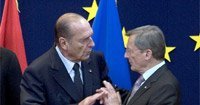I wonder if I expose myself here as the inhumane federalist for admitting that I feel much more sorry for a pile of articles than le Monsieur Président.
With him being dismissed in about 12 months time new horizons might open up and we can examine where we stand today to learn from the miseries of Monsieur Chirac and his European Stammtisch - äh.. Summit - mates.
The delivery problem
The one thing we should always remember from the Dutch, French, Spanish and Luxembourg referendums is that the biggest number of no-voters did so, because they were dissatisfied with their government, unhappy with the economic situation or feared the whole idea of globalisation and “neo-liberalism” on the wider front.
If we (and even more so the governments) want to win back these people for European integration, then we do indeed have to address the delivery problem. Historic links, peace and past economic prosperity are understandably not the kind of thing the long-term unemployed in eastern Germany cares much about. So, Europe and its national governments need to deliver more and better. But we all know that there are limits to what an intergovernmental Europe can do in terms of macro-economic management and job creation.
For me it goes without saying that tackling the social concerns of citizens is the priority of any executive. The more it saddens me that the Commission and European Council go out with a “delivery promotion” now. Have they not delivered so far?! But moreover, does this agenda not build up even higher expectations to what Europe can really do with the limitations of the existing decision-making mechanisms?
The issue of communication - and argumentation
The delivery agenda brings us to the second challenge - arguing the case for Europe. It cannot be that a (Dutch) prime minister comes up to the electorate to tell them that a no-vote in the referendum will bring back war in central Europe. If that is all we can say in defence of the Constitutional Treaty or indeed any further integration, we better buy an apartment house and stay in Ventotene. On the contrary, my impression was still that JEF was the one driving force both on European and national level to get at least some bottom-up activity both to influence the Treaty text as well as later during the ratification time.
Still, we face three problems, which we have to tackle if we do not want to loose out in 2007-2009 (again). Firstly, we need to sharpen our arguments, come up with the right examples for the right target groups and then get ourselves out to where we can influence people. Secondly, we are not the only ones in the “European family”. Both for national and European level I believe that there is so much more UEF and European Movements can do with us. Let us change them from the inside and turn them into the kind of citizen-campaign organisations that will mutually stimulate our work.
Finally, we need to reach beyond our own circles. How many interesting new groups have come up during and after the referendum campaigns? Let us embrace those groups with our meetings, tender applications, local debates, lobby activities or simply on the bar. Those are the people and the discussions we need to aim at. If we were boring, we would get stuck on ratification procedures. But we are the most exciting political youth organisation in Europe. And our goal lies clearly ahead of us: the adoption of this or a better Constitution.


Follow the comments: |
|
